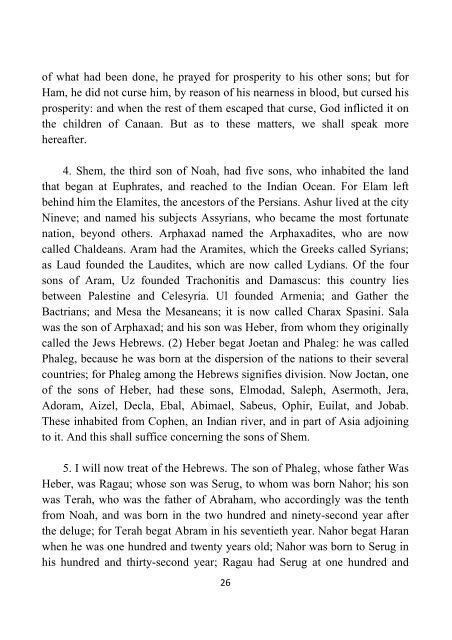From the Creation to the Death of Isaac - Flavius Josephus
- No tags were found...
Create successful ePaper yourself
Turn your PDF publications into a flip-book with our unique Google optimized e-Paper software.
<strong>of</strong> what had been done, he prayed for prosperity <strong>to</strong> his o<strong>the</strong>r sons; but for<br />
Ham, he did not curse him, by reason <strong>of</strong> his nearness in blood, but cursed his<br />
prosperity: and when <strong>the</strong> rest <strong>of</strong> <strong>the</strong>m escaped that curse, God inflicted it on<br />
<strong>the</strong> children <strong>of</strong> Canaan. But as <strong>to</strong> <strong>the</strong>se matters, we shall speak more<br />
hereafter.<br />
4. Shem, <strong>the</strong> third son <strong>of</strong> Noah, had five sons, who inhabited <strong>the</strong> land<br />
that began at Euphrates, and reached <strong>to</strong> <strong>the</strong> Indian Ocean. For Elam left<br />
behind him <strong>the</strong> Elamites, <strong>the</strong> ances<strong>to</strong>rs <strong>of</strong> <strong>the</strong> Persians. Ashur lived at <strong>the</strong> city<br />
Nineve; and named his subjects Assyrians, who became <strong>the</strong> most fortunate<br />
nation, beyond o<strong>the</strong>rs. Arphaxad named <strong>the</strong> Arphaxadites, who are now<br />
called Chaldeans. Aram had <strong>the</strong> Aramites, which <strong>the</strong> Greeks called Syrians;<br />
as Laud founded <strong>the</strong> Laudites, which are now called Lydians. Of <strong>the</strong> four<br />
sons <strong>of</strong> Aram, Uz founded Trachonitis and Damascus: this country lies<br />
between Palestine and Celesyria. Ul founded Armenia; and Ga<strong>the</strong>r <strong>the</strong><br />
Bactrians; and Mesa <strong>the</strong> Mesaneans; it is now called Charax Spasini. Sala<br />
was <strong>the</strong> son <strong>of</strong> Arphaxad; and his son was Heber, from whom <strong>the</strong>y originally<br />
called <strong>the</strong> Jews Hebrews. (2) Heber begat Joetan and Phaleg: he was called<br />
Phaleg, because he was born at <strong>the</strong> dispersion <strong>of</strong> <strong>the</strong> nations <strong>to</strong> <strong>the</strong>ir several<br />
countries; for Phaleg among <strong>the</strong> Hebrews signifies division. Now Joctan, one<br />
<strong>of</strong> <strong>the</strong> sons <strong>of</strong> Heber, had <strong>the</strong>se sons, Elmodad, Saleph, Asermoth, Jera,<br />
Adoram, Aizel, Decla, Ebal, Abimael, Sabeus, Ophir, Euilat, and Jobab.<br />
These inhabited from Cophen, an Indian river, and in part <strong>of</strong> Asia adjoining<br />
<strong>to</strong> it. And this shall suffice concerning <strong>the</strong> sons <strong>of</strong> Shem.<br />
5. I will now treat <strong>of</strong> <strong>the</strong> Hebrews. The son <strong>of</strong> Phaleg, whose fa<strong>the</strong>r Was<br />
Heber, was Ragau; whose son was Serug, <strong>to</strong> whom was born Nahor; his son<br />
was Terah, who was <strong>the</strong> fa<strong>the</strong>r <strong>of</strong> Abraham, who accordingly was <strong>the</strong> tenth<br />
from Noah, and was born in <strong>the</strong> two hundred and ninety-second year after<br />
<strong>the</strong> deluge; for Terah begat Abram in his seventieth year. Nahor begat Haran<br />
when he was one hundred and twenty years old; Nahor was born <strong>to</strong> Serug in<br />
his hundred and thirty-second year; Ragau had Serug at one hundred and<br />
26

















